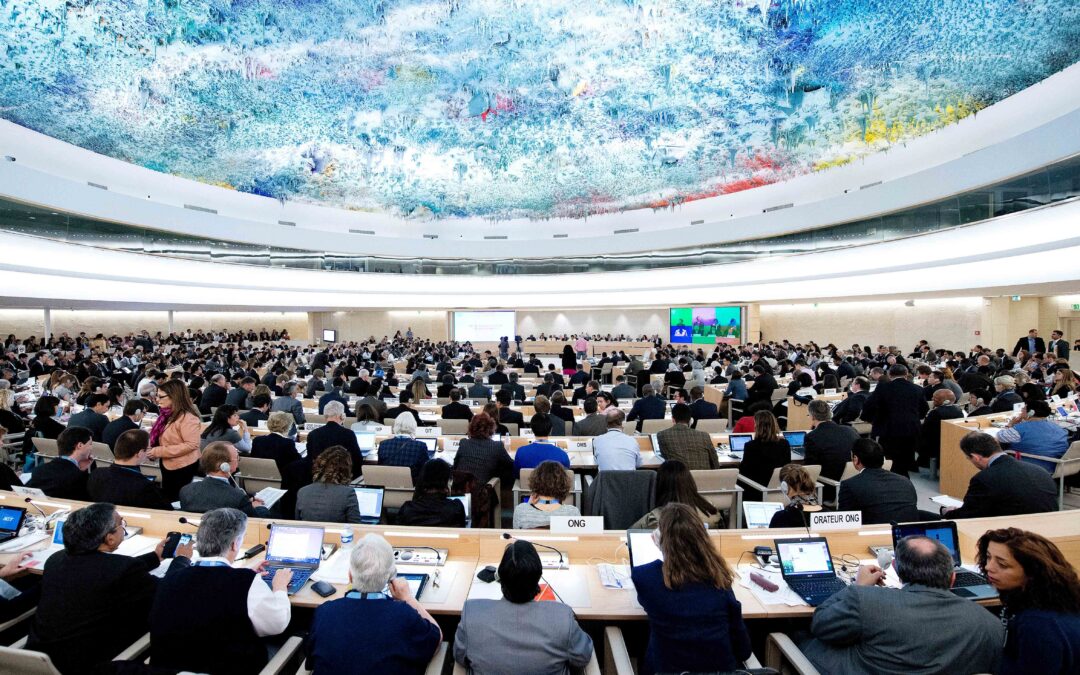
Jul 12, 2019 | Advocacy, Non-legal submissions
The ICJ joined other NGOs in an end-of-session statement, highlighting the achievements and shortfalls of the 41st Ordinary Session of the UN Human Rights Council, 24 June – 12 July 2019.
The statement, delivered by International Service for Human Rights (ISHR), reads as follows:
By renewing the mandate of the Independent Expert on protection against violence and discrimination based on sexual orientation and gender identity (SOGI), the Council has sent a clear message that violence and discrimination against people of diverse sexual orientations and gender identities cannot be tolerated. It reaffirmed that specific, sustained and systematic attention is needed to address these human rights violations and ensure that LGBT people can live a life of dignity. We welcome the Core Group’s commitment to engage in dialogue with all States, resulting in 50 original co-sponsors across all regions. However, we regret that some States have again attempted to prevent the Council from addressing discrimination and violence on the basis of SOGI.
The Council session also sent a clear message that Council membership comes with scrutiny by addressing the situations of Eritrea, the Philippines, China, Saudi Arabia and the Democratic Republic of Congo. This shows the potential the Council has to leverage its membership to become more effective and responsive to rights holders and victims.
The Council did the right thing by extending its monitoring of the situation in Eritrea. The onus is on the Eritrean Government to cooperate with Council mechanisms, including the Special Rapporteur, in line with its membership obligations.
We welcome the first Council resolution on the Philippines as an important first step towards justice and accountability. We urge the Council to closely follow this situation and be ready to follow up with additional action, if the situation does not improve or deteriorates further. We deeply regret that such a resolution was necessary, due to the continuation of serious violations and repeated refusal of the Philippines – despite its membership of the Council– to cooperate with existing mechanisms.
We deplore that Council members, such as the Philippines and Eritrea, sought to use their seats in this Council to seek to shield themselves from scrutiny, and those States[1] who stand with the authorities and perpetrators who continue to commit grave violations with impunity, rather than with the victims.
We welcome the written statement by 22 States on China expressing collective concern over widespread surveillance, restrictions to freedoms of religion and movement, and large-scale arbitrary detention of Uyghurs and other minorities in Xinjiang. We consider it as a first step towards sustained Council attention and in the absence of progress look to those governments that have signed this letter to follow up at the September session with a resolution calling for China to allow access to the region to independent human rights experts and to end country-wide the arbitrary detention of individuals based on their religious beliefs or political opinions.
We welcome the progress made in resolutions on the rights of women and girls: violence against women and girls in the world of work, on discrimination against women and girls and on the consequences of child, early and forced marriage. We particularly welcome the renewal of the mandate of the Working Group on Discrimination Against Women and Girls under its new name and mandate to focus on the intersections of gender and age and their impact on girls. The Council showed that it was willing to stand up to the global backlash against the rights of women and girls by ensuring that these resolutions reflect the current international legal framework and to resist cultural relativism, despite several amendments put forward to try and weaken the strong content of these resolutions.
However, in the text on the contribution of development to the enjoyment of all human rights, long standing consensus language from the Vienna Declaration for Programme of Action (VDPA) recognising that, at the same time, “the lack of development may not be invoked to justify the abridgement of internationally recognized human rights” has again been deliberately excluded disturbing the careful balance established and maintained for several decades on this issue.
We welcome the continuous engagement of the Council in addressing the threat posed by climate change to human rights, through its annual resolution and the panel discussion on women’s rights and climate change at this session. We call on the Council to continue to strengthen its work on this issue, given its increasing urgency for the protection of all human rights.
The Council has missed an opportunity on Sudan where it could have supported regional efforts and ensured that human rights are not sidelined in the process. We now look to African leadership to ensure that human rights are upheld in the transition. The Council should stand ready to act, including through setting up a full-fledged inquiry into all instances of violence against peaceful protesters and civilians across the country.
During the interactive dialogue with the Special Rapporteur on extrajudicial and summary executions, States heard loud and clear that the time to hold Saudi Arabia accountable is now for the extrajudicial killing of journalist Jamal Khashoggi. We recall that women human rights defenders continue to be arbitrarily detained despite the calls by 36 States at the March session. We urge States to adopt a resolution at the September session to establish a monitoring mechanism over the human rights situation in the country.
We welcome the landmark report of the High Commissioner on the situation for human rights in Venezuela; in response to the grave findings in the report and the absence of any fundamental improvement of the situation in the meantime, we urge the Council to adopt a Commission of Inquiry or similar mechanism in September, to reinforce the ongoing efforts of the High Commissioner and other actors to address the situation.
We welcome the renewal of the mandate on the freedom of peaceful assembly and association. This mandate is at the core of our work as civil society and we trust that the mandate will continue to protect and promote these fundamental freedoms towards a more open civic space.
We welcome the renewal of the mandate of the Special Rapporteur on Belarus. We acknowledge some positive signs of re-engagement in dialogue by Belarus, and an attempted negotiation process with the EU on a potential Item 10 resolution. However, in the absence of systemic human rights reforms in Belarus, the mandate and resolution process remains an essential tool for Belarusian civil society. In addition, there are fears of a spike in violations around upcoming elections and we are pleased that the resolution highlights the need for Belarus to provide safeguards against such an increase.
We welcome the renewal of the quarterly reporting process on the human rights situation in Ukraine. However, we also urge States to think creatively about how best to use this regular mechanism on Ukraine to make better progress on the human rights situation.
The continued delay in the release of the UN database of businesses engaged with Israeli settlements established pursuant to Council resolution 31/36 in March 2016 is of deep concern. We join others including Tunisia speaking on behalf of 65 states and Peru speaking on behalf of 26 States in calling on the High Commissioner to urgently and fully fulfil this mandate as a matter of urgency and on all States to cooperate with all Council mandates, including this one, and without political interference.
Numerous States and stakeholders highlighted the importance of the OHCHR report on Kashmir; while its release only a few days ago meant it did not receive substantive consideration at the present session, we look forward to discussing it in depth at the September session.
Finally, we welcome the principled leadership shown by Belgium, Luxembourg and the Netherlands, in pursuing accountability for individual victims of acts of intimidation and reprisals under General Debate Item 5, contrasting with other States which tend to make only general statements of concern, and call on States to raise all individual cases at the interactive dialogue on reprisals and intimidation in the September session.
(text in italics was not read out due to the limited time)
Signatories:
- International Service for Human Rights (ISHR)
- Amnesty International
- ARTICLE 19
- Asian Forum for Human Rights and Development (FORUM-ASIA)
- Association for Progressive Communications (APC)
- Cairo Institute for Human Rights Studies
- Center for Reproductive Rights
- CIVICUS: World Alliance for Citizen Participation
- DefendDefenders (the East and Horn of Africa Human Rights Defenders Project)
- Franciscans International
- Global Initiative for Economic, Social and Cultural Rights
- Human Rights House Foundation
- Human Rights Watch
- International Commission of Jurists (ICJ)
- International Federation for Human Rights (FIDH)
- International Lesbian and Gay Association (ILGA)
[1] States who voted against the resolution on Eritrea: Bahrain, Burkina Faso, Cameroon, China, Cuba, Egypt, Eritrea, Iraq, India, Saudi Arabia, Somalia, the Philippines and Pakistan.
States who voted against the resolution on the Philippines: Angola, Bahrain, Cameroon, China, Cuba, Egypt, Eritrea, Hungary, Iraq, India, Qatar, Saudi Arabia, Somalia, and the Philippines.
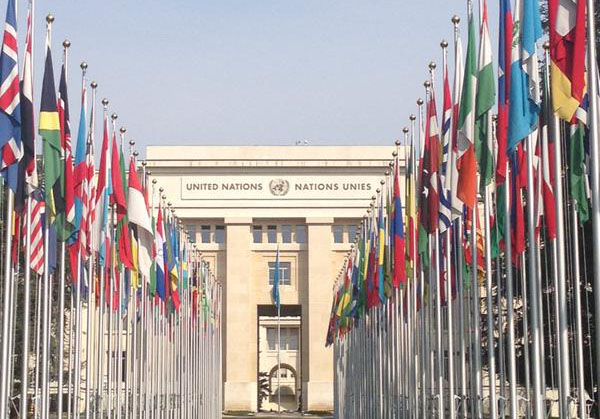
Jul 3, 2019 | Advocacy, Non-legal submissions
The ICJ today joined other NGOs in urging the UN Human Rights Council to take action on the Philippines.
The joint oral statement was delivered by the World Organisation Against Torture (OMCT) on behalf of OMCT, Amnesty International, the International Commission of Jurists (ICJ), Franciscans International, Swiss Catholic Lenten Fund, the International Federation for Human Rights (FIDH), FORUM-Asia. It read as follows:
“In March 2019, the UN High Commissioner for Human Rights noted that several sources “estimate that up to 27,000 people may have been killed in the context of the campaign against illegal drugs since mid-2016.”
Unlawful killings, including of children, carry on, and President Rodrigo Duterte and his administration continue to explicitly encourage these acts. In June 2019, the scale and seriousness of the reported human rights violations prompted 11 UN human rights experts to call on the Council to establish an independent investigation into such violations.
Intimidations by government officials at the highest levels against politicians, human rights defenders, journalists, and several Special Procedures mandate holders have also been rising.
At the 35th, 36th, and 38th sessions of the Council, Iceland, on behalf of a group of States, explicitly called on the government “to take all necessary measures to bring killings associated with the campaign against illegal drugs to an end and cooperate with the international community to investigate all related deaths and hold perpetrators accountable.”
In light of the failure of the government to effectively investigate and bring to justice those responsible, we urge all States to support the adoption of a resolution on the Philippines at this session, mandating the OHCHR to monitor and provide regular updates on the human rights situation to the Council, as the first step toward establishing an independent international investigation into extrajudicial killings and other human rights violations committed in the government’s ‘war on drugs.’.
Such a response is all the more important given the Philippines obligations to uphold the highest standards in human rights as a member of the Council.”
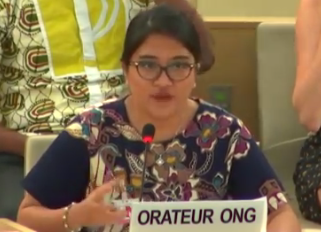
Jun 27, 2019 | Advocacy, Non-legal submissions
The ICJ highlighted the role of women in ensuring respect for human rights in relation to businesses, in a statement to the UN Human Rights Council today.
In an oral statement made during an interactive dialogue with the Working Group on Discrimination Against Women and the Working Group on the issue of human rights and transnational corporations and other business enterprises, the ICJ stated as follows (check against delivery):
The International Commission of Jurists (ICJ) welcomes the report of the Working Group on the issue of human rights and transnational corporations and other business enterprises, and agrees that despite years of progress, women continue to experience multiple forms of discrimination. Women’s voices continue to be unheard and they face insurmountable challenges as they use these voices to access justice on behalf of their communities.
We have seen numerous cases where women lead their communities in protesting abuses committed by business enterprises. Many of these communities are located in remote areas, far from courts or other mechanisms that could be used by them to seek justice. The women who lead these communities often do not identify as women human rights defenders. They see themselves as mothers protecting the health of their families or the land from which they grow their food and earn their living. Because of where these communities are located, local government authorities play a significant role on whether or not these women are heard or are able to access justice.
The women farmers of Kendeng in Indonesia, for instance, have been protesting the operation of a cement factory in their area, which contaminate their water and land. In 2016, the Supreme Court of Indonesia had already ruled in favor of these women farmers and their community, and ordered the revocation of the cement factory’s permit. To this day, however, the cement factory continues to operate, ignoring the final order of the Supreme Court. The Kendeng women farmers have raised the non-implementation of the Supreme Court’s order with the Governor of Central Java and the Indonesian government, but their voices remain unheard.
In the Philippines, the women community leaders of Pio V. Corpus, Masbate, have been protesting plans to establish a cement factory and a coal-fired power plant in their town. They allege that their local government leaders approved plans for this factory and power plant without consultation and in blatant disregard of the disastrous impact these would have on the environment and people’s health.
Mr. President, we join the Working Group in urging States and business enterprises to ensure meaningful participation of potentially affected women in all stages of human rights due diligence. We also urge States to take measures to ensure that women – wherever they may be located – are able to access justice for abuses committed by business. Finally, we recommend that local government authorities be made aware of the Guiding Principles and able to integrate the gender framework and guidance in discharging their human rights responsibilities.
Thank you.
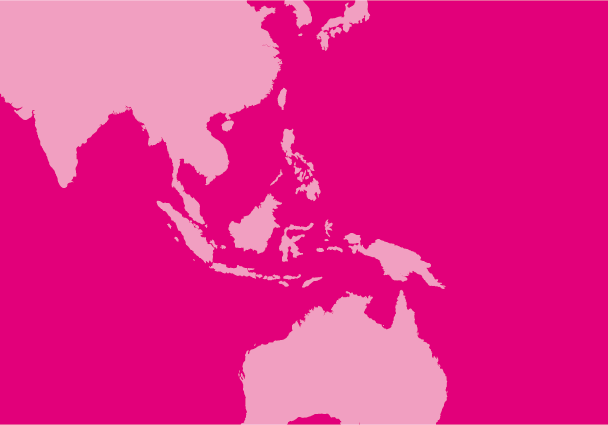
Jun 25, 2019 | News
Myanmar’s 1982 Citizenship Law, which has fueled widespread discrimination against various ethnic minority groups, is irreconcilable with core rule of law principles and the State’s obligations under international human rights law, the ICJ said today in a briefing paper.
The briefing paper Citizenship Law and Human Rights in Myanmar: Why Law Reform is Urgent and Possible (available in English and Burmese) analyses the legal framework for citizenship in Myanmar, and assesses certain provisions of the 2008 Constitution relevant to citizenship as well as the 1982 Citizenship Law.
This law embedded the current narrow definition of citizenship, which generally links citizenship acquisition to membership of a prescribed “national race.”
The resulting system enables and legitimizes discrimination against various groups, particularly against persons of South Asian or Chinese descent, members of whole ethnic groups, such as the Rohingya, and also the children of single mothers.
“Enacted by unelected military governments, Myanmar’s citizenship laws fuel widespread discrimination throughout the country,” said Sean Bain, Legal Adviser for the ICJ.
“The government must act immediately to dismantle this discriminatory system and to protect in law the human rights of all persons,” he added.
The intentionally discriminatory character of this law, and its equally discriminatory implementation, largely explain why many long-term residents of Myanmar lack a legal identity (more than 25 percent of persons enumerated in the 2014 Census).
The ICJ recommends three immediately achievable, concrete areas of law reform to the Government: 1) legislative reform, including most urgently of the 1982 Citizenship Law and the Child Rights Bill now being considered by the parliament; 2) Constitutional reform, to protect the right of citizens to full political participation; and 3) to institute interim measures to address discrimination on the basis of race or ethnicity.
A review of the 1982 Law was recommended in 2017 by the Government’s advisory commission chaired by the late United Nations Secretary-General Mr Kofi Annan, but the Government has not yet demonstrated any tangible progress on this.
“The government has the means at hand to get rid of this discriminatory system, which has undermined the rule of law and blocked the development of a pluralistic democracy. The government can and must implement the recommendations of its own advisory commission. The pervasiveness of discrimination cannot continue to go unaddressed, and there are no reasonable legal grounds for further delay in initiating pathways to reform,” Bain said.
UN Member States, as well as International Finance Institutions and UN agencies, must also ensure that assistance to the Government of Myanmar enables necessary reforms, and does not, in any way, entrench the existing discriminatory system.
Coinciding with the launch of this report, yesterday the ICJ hosted an event in Yangon where a panel of Myanmar legal scholars and researchers discussed the impact of current legal arrangements for citizenship on human rights, and why law reform is both urgent and possible. Representatives including from diplomatic missions, UN agencies, the Myanmar National Human Rights Commission, a multilateral donor and Non-Government Organizations attended the event.
Background
“Citizenship” is a legal concept describing an individual’s relationship to the State. In contrast, “statelessness” is when somebody does not have citizenship of any State. Terms such as “nationality,” “race” or “ethnicity” are generally culturally embedded concepts, understood differently by different people and in different contexts.
In many countries, particularly those with diverse populations, the right to citizenship is defined broadly to include persons with different ethnicities and even nationalities. In post-independence Myanmar, the concept of being a “national” or “indigenous” had a generally broad definition, allowing persons of different backgrounds to become citizens, including but not limited to the descendants of persons who had immigrated to Myanmar.
The 1982 Citizenship Law embedded in legislation the concept of “national races,” and introduced a hierarchy of citizenship categories that effectively institutes first-class and second-class citizens. Under this system, many life-long residents of Myanmar have effectively been rendered stateless, including members of entire ethnic groups, and children of mixed ancestry.
This discriminatory system has fostered an environment where crimes against humanity have taken place with absolute impunity.
Although section 347 of Myanmar’s 2008 Constitution guarantees “any person to enjoy equal rights” and protections before the law, other constitutional provisions restrict “fundamental rights” to citizens, including the rights to health and to education. Even for citizens, political rights are limited if a parent, child or spouse is not a citizen of Myanmar – the most infamous example of this is Daw Aung San Suu Kyi, who is constitutionally barred from the Presidency because her sons are foreign citizens.
The formation in February of this year of a Constitutional Amendment Committee also presents opportunities to expand the narrow definition of “fundamental rights,” to ensure their compliance with the constitutional guarantee of equality and protection before the law for “any person” (section 347), and with the State’s international human rights law obligations.
The Child Rights Bill, currently under consideration by the parliament, also offers opportunities to ensure that Myanmar’s laws comply with its treaty obligations, for example, under the UN Convention on the Rights of the Child, including with respect to the right of a child to acquire a nationality (citizenship), and the State’s related obligation to prevent statelessness.
See also
ICJ convenes workshop on reforming 1982 Citizenship law
ICJ materials on human rights law in Myanmar
Download
Myanmar-Citizenship law reform-Advocacy-Analysis Brief-2019-ENG (full report in English)
Myanmar-Citizenship law reform-Advocacy-Analysis Brief-2019-BUR (full report in Burmese)
Myanmar-Citizenship law reform-News-web story-2019-BUR (full story in Burmese)
Contact
Sean Bain, ICJ Legal Adviser, sean.bain(a)icj.org
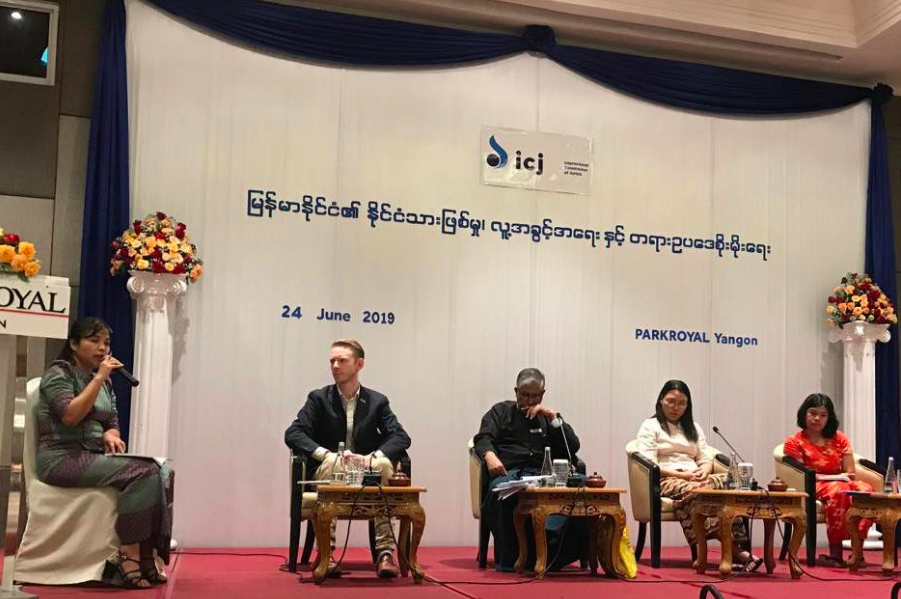
Jun 24, 2019 | News
The ICJ convened a half-day panel discussion today in Yangon, Myanmar, to discuss national laws governing citizenship, and outline how, throughout the country, they have a discriminatory impact on people’s enjoyment of their human rights.
The event also provided the opportunity to introduce the ICJ’s new legal briefing Citizenship and Human Rights in Myanmar: Why Law Reform is Urgent and Possible
ICJ legal researcher Ja Seng Ing and legal adviser Sean Bain kicked off the event by noting that Myanmar’s legal framework for citizenship – enacted by unelected military governments – fuels widespread discrimination against members of ethnic minority groups throughout the country.
Bain highlighted the incompatibility of the domestic legal framework governing citizenship in Myanmar with core rule of law principles and with the State’s obligations under international human rights law, including the Convention on the Rights of the Child.
He presented the ICJ’s practical recommendations for law reform, outlined in the ICJ’s new legal briefing, including with respect to the 1982 Citizenship Law and the 2008 Constitution, and to the Child Rights Bill currently under consideration by Myanmar’s national parliament.
Senior Advocate U Ohn Maung, a lawyer with decades of experience supporting access for members of minority groups to the official documentation often necessary to obtain even basic services, emphasized that citizenship in Myanmar should be a more inclusive concept, reflective of its pluralistic, multi-ethnic demography.
Daw Zarchi Oo and Daw Su Chit shared the findings of independent civil society research.
They highlighted various groups including: migrants and migrant workers; individuals belonging to sexual and/or gender minorities; single mothers; the children of fathers who are foreign nationals or who are estranged from their fathers; and people living with disabilities, who are all adversely impacted by current legal arrangements for citizenship and by their discriminatory implementation.
Daw Zarchi Oo also spoke about her own past experience of being stateless, and Daw Su Chit elaborated on her work with civil society and others to develop a gendered analysis of the impact of discriminatory citizenship laws in Myanmar.
Around 60 participants, including from domestic civil society, the legal community, international non-government organizations, the Myanmar National Human Rights Commission, the diplomatic community and others joined this event, and participated in the discussions.
The 1982 Citizenship Law embedded the current narrow definition of citizenship, which generally links its acquisition to membership of a prescribed “national race.”
Many of the 2008 Constitution’s provisions on “fundamental rights” are restricted to citizens only, with a result being that the State generally does not recognize the human rights of persons who do not qualify as citizens under domestic law, or are otherwise excluded due to the laws’ discriminatory implementation.
The intentionally discriminatory character of the 1982 Law, and its discriminatory implementation, largely explains why many long-term residents of Myanmar lack a legal identity (more than 25 percent of persons enumerated in the 2014 Census).
The situation of Rohingya people, who the State generally does not recognize as citizens, is the most egregious example of the human rights violations associated with this system.
This event is part of the ICJ’s broader support to promote and protect human rights in Myanmar through research, analysis, advocacy and creating spaces for discussion.
See also:
ICJ convenes workshop on reforming 1982 Citizenship law









